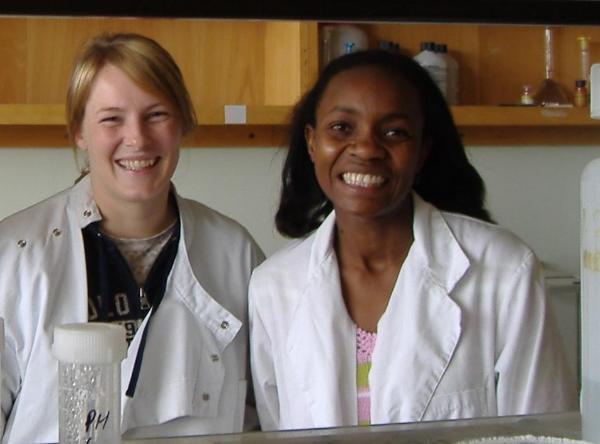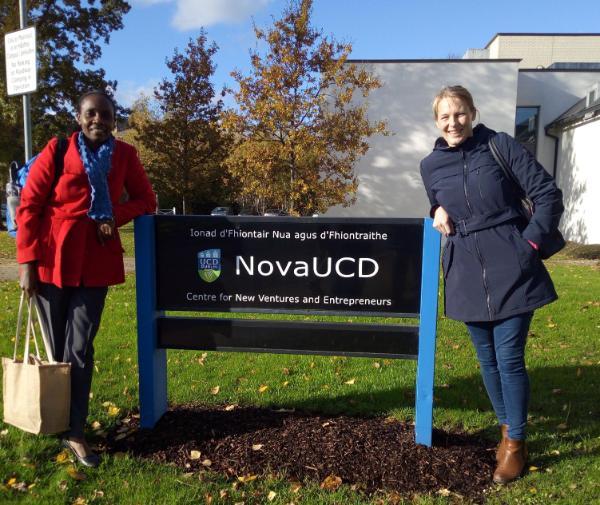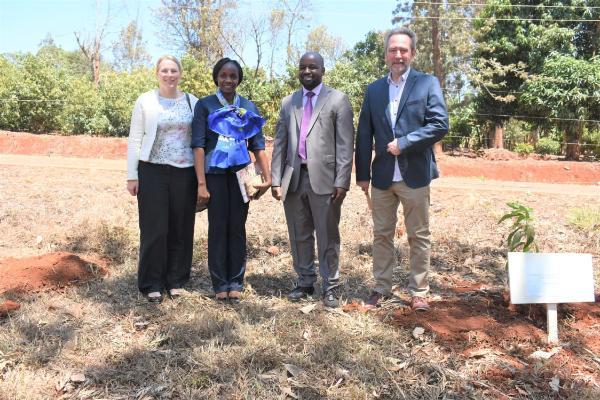
Dr Niamh Harbourne (UCD) and Dr Eunice Marete (Commission for University Education, Kenya) first met and collaborated as doctoral students at UCD. Although now 11,000km apart, they continue to work together to tackle food security challenges through educational development. By leveraging Erasmus+ ICM funding, they have developed a joint food sustainability module, kick-started research into indigenous Kenyan foods and deepened institutional connections through a series of mobility exchanges. UCD Global asked them about the origins of their partnership, highlights of their experiences and what they hope to achieve together long-term.
Your research collaboration on food sustainability dates back to your student days - tell us how that evolved into an Erasmus+ project.
Niamh: Eunice and I first worked together as PhD students at UCD - we worked very well together on the same research project under the supervision of Prof. Dolores O’Riordan (now VP for Global Engagement at UCD) and Dr. Jean-Christophe Jacquier. After we finished our PhDs we kept in touch and looked for ways that we could continue to collaborate.
Eunice: We have shared research interests in food security and the bioeconomy so it made sense that this would be the area we would collaborate on.

When you initially applied for Erasmus+ ICM funding, what did you hope to achieve?
Eunice: When Niamh and I applied for the funding through our respective institutions, I was a Senior Lecturer and also serving as the Director, Quality Assurance and Career services, at Meru University of Science and Technology (MUST). We wanted to develop joint research and teaching modules that would enhance food security, bioeconomy and HEI standards in Ireland and Kenya. MUST and UCD have areas of expertise in this area that complement each other so we knew that both staff and students would have a lot to gain through teaching and research collaborations.
Niamh: We were also keen to create opportunities for staff and students to gain direct exposure to working in another national context in order to broaden cultural awareness, as well as understanding of the unique challenges faced in both countries.
A key outcome from the project was the development of a joint UCD-MUST module on food sustainability. What were the other positives?
Niamh: Internationalisation of the curriculum. While our undergrads and postgrads could not visit Kenya through the project, the academics from MUST who visited UCD taught on our undergraduate and postgraduate programmes, giving our students a direct appreciation for the cultural differences (and similarities) between Kenya and Ireland. A number of our undergraduate students decided to focus their research projects on Kenyan foods, including the indigenous Kenyan fruits Dovyalis caffra and Dovyalis abyssinica. These fruits have a bright yellow colour, are high in vitamin C and are sour in taste.
Eunice: It opened up an opportunity for Kenyan students to be exposed to life in UCD and Ireland as a whole. I believe that this experience has totally changed their thinking and positively impacted their future studies and work.

Looking to the future, what’s next for the collaboration now that you have completed your first Erasmus+ project?
Niamh: One of the most significant achievements of our project was the graduation of a PhD student, Daniel Waweru, that we co-supervised alongside Associate Professor Joshua Arimi and Dr. JC Jacquier. Daniel was the first Food Science PhD student to graduate from MUST and his research focused on indigenous fruits. We are keen to build on this through the development of a joint PhD programme in food sustainability, thereby increasing future research into indigenous and underutilised Kenyan foods. We were recently awarded UCD Africa Engagement Seed Funding; as a result of this Dr. Jacquier and I will be visiting Kenya in September 2024 to progress the development of the joint PhD programme.
Eunice: We’re also keen to share our experiences from this Erasmus+ project with other Kenyan universities and scholars as some of our lessons learnt have national relevance. We have applied for a further round of Erasmus+ funding and, if successful, our next collaboration would have a strong knowledge-sharing dimension and involve national bodies who could support the dissemination of best practices at the higher education level.
What advice would you give to colleagues considering a similar project?
Eunice: Plan well for the mobility trips and apply for visas in good time. Also be ready for the unexpected and be flexible. For example, the Covid-19 pandemic happened during the lifespan of the project and we had to implement many of our mobilities in a short space of time after restrictions were lifted, so that created challenges. Also the postgraduate student was locked down in Ireland, which was challenging for him.
Niamh: I highly recommend participating in a mobility project. Not only will you expand your international network, but you'll also have the chance to contribute to projects that create a positive global impact. However, Ireland - and Dublin in particular - is expensive for visiting staff and students so it is worth bearing in mind that the grant amount for students may not cover all their costs.
Through the project, you each had the opportunity to complete an Erasmus+ staff mobility period at each other’s institutions. What were the highlights of the experience?
Eunice: The people - so welcoming, similar to Kenya! When I left Ireland, I missed the Spring season with the beautiful flowers in the fields, a therapy in itself.
Niamh: I had so many wonderful experiences in Kenya but the highlights include meeting the staff and students in MUST, visiting an animal orphanage (a treatment and rehabilitation centre for animals that have been rescued, injured or abandoned) and learning to make ugali (stiff porridge made from corn flour)!
If you had to choose one learning from the experience that stands out, what would it be?
Eunice: The exchange helped me to appreciate the relationship with colleagues and fellow students, as this all came about through our working relationship in the laboratory. It’s not all about the degree certificate – it goes far beyond.
Niamh: My visit to Kenya gave me a greater appreciation of the challenges they are facing with climate change. Like Eunice, it also helped me to appreciate the importance of the relationships you build with people you are studying with – as PhD students, we would never have imagined that we would still have such a strong friendship and professional collaboration so many years later!
Find out more about Erasmus+ ICM exchange
- Dr Eunice Marete and Dr Niamh Harbourne undertook Erasmus+ ICM staff teaching mobility periods funded under the Erasmus+ International Credit Mobility funding programme (now known as Erasmus+ Key Action 171).
- Dr Niamh Harbourne is Assistant Professor in the School of Agriculture and Food Science, UCD. Dr Eunice Marete is Deputy Commission Secretary, Standards and Quality Assurance Division at the (opens in a new window)Commission for University Education, Kenya and formerly a Senior Lecturer at Meru University of Science and Technology, Kenya.
- Funding for the three-year project was awarded in 2020 by the(opens in a new window) Higher Education Authority, Ireland's Erasmus+ National Agency, to support the academic mobility of students and staff between the two institutions.
- Erasmus+ Key Action 171 is an EU-funded programme that supports the academic mobility of students and staff between Erasmus programme countries (broadly speaking, EU countries) and partners from third countries not associated with the Erasmus+ programme (broadly speaking, non-EU countries).
- Between 2015 and 2023, UCD obtained almost €1.5 million in KA171 funding to support the academic mobility of 340 students and staff between Ireland and 32 partner countries worldwide.
- Find out more about Erasmus+ ICM projects or contact (opens in a new window)erasmusicm@ucd.ie
Photo captions:
- Niamh(L) and Eunice (R) in the lab at UCD during their student days
- Niamh and Eunice onsite at UCD during their Erasmus+ project in more recent times.
- L-R: Dr Niamh Harbourne (UCD), Dr Eunice Marete (CUE), Dr Joshua Arimi (MUST) and Dr Jean-Christophe Jacquier (UCD) in Meru, Kenya.
- Niamh and Eunice on campus at UCD during graduation.